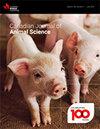Effects of partial replacement of fishmeal with dried porcine soluble on the growth performance, nutrient digestibility, fecal microbiota, and fecal score in weaning pig
IF 1.2
4区 农林科学
Q3 AGRICULTURE, DAIRY & ANIMAL SCIENCE
引用次数: 0
Abstract
Dried porcine solubles (DPS) is the by-product obtained during the extraction of heparin from the porcine mucosa of the small intestine. The effects of partially replacing fishmeal with DPS in weaning pig diets on growth performance, nutrient digestibility, fecal microbial count, and fecal score was investigated here. A total of 70 crossbred [(Yorkshire × Landrace) × Duroc] weaning pigs were divided into two dietary treatment groups. Dietary treatments, CON: 3% fishmeal; DPS: 1.5% fishmeal and 1.5% dried porcine solubles. Average daily gain was tended to increase (p<0.10) in weaning pigs fed DPS compared to the CON group in week 2. Digestibility of dry matter was tended to improve (p<0.10) in weaning pigs fed pigs fed DPS diet group in week 2 and week 5. Fecal Lactobacillus count was tended to increase (p<0.10) and E. coli was tended to decrease (p<0.10) in weaning pigs fed DPS compared to the weaning pigs fed CON at week 5 of the feeding trial. Our findings suggest that partially replacing fishmeal with dried porcine solubles in weaning pig diets can have beneficial effects on the growth performance through the tendency to improve dry matter digestibility and fecal microbiota.用猪可溶性干粉部分替代鱼粉对断奶猪生长性能、营养物质消化率、粪便微生物群和粪便评分的影响
猪干溶质(DPS)是从猪小肠粘膜中提取肝素过程中得到的副产品。本文研究了在断奶猪日粮中用 DPS 部分替代鱼粉对生长性能、营养物质消化率、粪便微生物数量和粪便评分的影响。将 70 头杂交[(约克夏×陆地赛)×杜洛克]断奶猪分为两个日粮处理组。日粮处理组:CON:3%鱼粉;DPS:1.5%鱼粉和 1.5% 猪干溶解物。在第 2 周,与 CON 组相比,饲喂 DPS 的断奶猪的平均日增重呈上升趋势(p<0.10)。在第 2 周和第 5 周,饲喂 DPS 日粮组的断奶猪的干物质消化率有提高的趋势(p<0.10)。与饲喂 CON 的断奶猪相比,在饲喂试验的第 5 周,饲喂 DPS 的断奶猪的粪便乳酸杆菌数呈上升趋势(p<0.10),大肠杆菌呈下降趋势(p<0.10)。我们的研究结果表明,在断奶猪日粮中用干猪粪溶解物部分替代鱼粉可提高干物质消化率和粪便微生物群,从而对生长性能产生有利影响。
本文章由计算机程序翻译,如有差异,请以英文原文为准。
求助全文
约1分钟内获得全文
求助全文
来源期刊

Canadian Journal of Animal Science
农林科学-奶制品与动物科学
CiteScore
2.30
自引率
0.00%
发文量
51
审稿时长
6 months
期刊介绍:
Published since 1957, this quarterly journal contains new research on all aspects of animal agriculture and animal products, including breeding and genetics; cellular and molecular biology; growth and development; meat science; modelling animal systems; physiology and endocrinology; ruminant nutrition; non-ruminant nutrition; and welfare, behaviour, and management. It also publishes reviews, letters to the editor, abstracts of technical papers presented at the annual meeting of the Canadian Society of Animal Science, and occasionally conference proceedings.
 求助内容:
求助内容: 应助结果提醒方式:
应助结果提醒方式:


